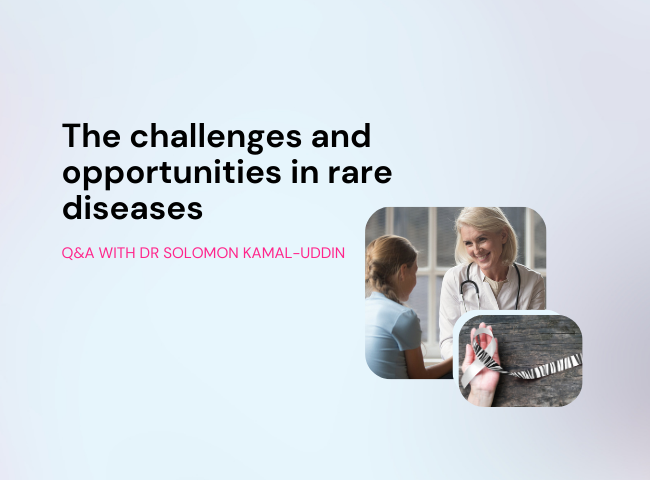
Q&A with Dr Solomon Kamal-Uddin: The challenges and opportunities in rare diseases
We spoke with Dr Solomon Kamal-Uddin, Director of Medical Strategy at BC Platforms, about the challenges of working on rare diseases, the opportunities real-world data (RWD) can provide in advancing treatments and therapies for these diseases, and how BC Platforms is supporting critical breakthroughs in the space.
Can you tell me the story of your interest in rare diseases as a speciality and how you got involved?
Kamal-Uddin: My journey started with paediatrics. As a paediatrician, the nature of my job was to support a vulnerable population, build relationships and be very symptom-orientated in how I understood and diagnosed a patient and their family’s pathway. This pathway and its challenges can also be seen in rare diseases; you have to pay close attention to symptoms and understand the patient burden.
There are other overlaps as well. Up to 70% of paediatric diseases are rare diseases. They tend to have a paediatric focus because, firstly, the genetic basis of many rare diseases means they are present in early life. Unfortunately, many of these patients don’t make it into adulthood. In many cases, with a rare disease, it’s not well understood or even diagnosable. Both communities also face unique challenges when it comes to drug development.
I then moved into paediatric emergency medicine and gained further clinical exposure, especially pre-diagnosis. Surprisingly enough, the A&E environment also overlaps quite strongly with rare diseases. The ‘Diagnostic Journey’ is a big chapter of the rare disease space.
Could you share with us your journey as a parent of a child with a rare disease?
Kamal-Uddin: My youngest daughter, who’s eight years old, has a rare disease, and as a family, we’ve experienced the diagnostic journey. We were lucky to get her diagnosis as it has only been described in very few individuals – a random genetic mutation. We take each day as it comes. It has given me a greater understanding of rare diseases from the perspective of a parent and clinician.
The rare diseases community is under-served in terms of therapeutic options. I believe those who choose to work in rare diseases are inspiring and passionate professionals who are hard workers and innovative, respect the patient and their journey and support access to much-needed treatments. One of my biggest motivations in the rare disease space is that it’s a very stimulating space to do good in.
What insights into rare diseases did you gain as you transitioned into R&D?
Kamal-Uddin: I moved out of the NHS 4-5 years ago to continue developing my skill set, joining a major contract research organisation (CRO) as part of their Paediatric and Rare Disease Centre of Excellence. I was lucky enough to take a deep dive into many clinical trials, and was able to contribute extra insights based on my clinical experience.
With rare diseases, the landscape hasn’t been properly mapped; there’s so much benefit to be gained from different stakeholders speaking and learning from each other.
I then moved to a rare disease biotech, working in medical affairs, where I came to understand the post-marketing challenges in rare diseases and had exposure to early access schemes for drugs. My background experience in navigating communication barriers with clinicians and speaking to patients about the real challenges they face came in useful. I’ve also been privileged to have supported rare disease patient-centred organisations.
What are the current challenges in rare diseases? For patients, for drug developers, for clinicians?
Kamal-Uddin: There are immense challenges in the pre-diagnosis space. This is partly due to a lack of educational awareness among clinicians, meaning that patients can be bounced between different specialities. Given the direction in which the healthcare system is developing, there is less bandwidth to look for rare explanations of pathology. Increased automation means that data might be analysed and report a horse based upon average values when, in fact, it’s a zebra. Post-diagnosis educational support among clinicians is also needed.
For the Life Sciences industry, there are challenges at every step in the drug development pipeline, which are magnified for rare diseases, including more expensive and lengthy clinical trials. The industry is also tasked with generating high-quality evidence for regulatory bodies and health authorities. Randomised controlled trials remain the gold standard for evidence generation when evaluating the effects of interventions, but they are long and expensive. With rare diseases, these come with additional challenges. Given that the population is so small, it can be difficult to adequately identify enough patients to reflect the real-world population.
Furthermore, a lack of biomedical knowledge of pathology, biomarkers, and disease progression can make designing the trial difficult. It may also be unethical or unfeasible to assess drugs; for instance, patients may already be on a drug through early access schemes. There is often a high rate of morbidity and mortality, which impacts follow-up. Many of the challenges impact the generation of the evidence required to meet regulatory and healthcare bodies’ approval of new drugs.
In your view, how is real-world data (RWD) positioned to help drive forward therapies for rare diseases?
Kamal-Uddin: It takes up to 20 years to develop a drug. This includes inefficiencies in the process that can increase costs, time, and resources. RWD is all the information about a patient’s journey outside a clinical trial and is particularly powerful for rare diseases. By helping map the clinical rare disease pathway across the healthcare journey and disease progression, RWD can bring efficiencies to drug development and reduce patient burden. Existing examples in Duchenne muscular dystrophy, spinal muscular atrophy, and Huntington’s disease already show us the potential wins.
In recognition of the evolving landscape and the challenges involved, the FDA and MHRA have both released guidance on the use of RWD in regulatory submissions, to aid the life sciences industry. This is a positive step forward for all involved in rare diseases.
While RWD presents an opportunity, it does not come without its own hurdles. Often, there can be limitations when identifying data sources with sufficient volume and quality early in the process. There are also strict governance rules around information that must be adhered to; therefore, mining data requires a nuanced approach. Finally, when you have the data, how do you harmonise and analyse it to produce relevant outcomes to benefit all stakeholders? That’s where BC Platforms comes in—harmonising the language and data across stakeholders and clinical workflows.
Can you tell me about your work with BC Platforms and how they use RWD?
Kamal-Uddin: Rare disease is one of BC Platforms’ biggest therapeutic areas, and the company has actively gone out to find people like myself who understand the impact RWD can have on rare diseases. BC Platforms has a significant heritage in creating safe and secure genomics platforms for a wide variety of clinical applications, research, and drug discovery. My role is to support RWD to address drug development and healthcare hurdles.
Equipped with this experience, the company has a bespoke data platform that can meet the needs of healthcare professionals and the life sciences industry. BC Platforms is building a team that meets the current challenges and is well-positioned to bring innovation and accessibility to facilitate the use of RWD. They have recently acquired Medexprim, which will help identify and facilitate access to more data sources, and 4Pharma for its understanding of how to set up and run RWD data studies at the site and global level.
BC Platforms has a global footprint that processes data beyond medical claims and billing data to capture further nuances in the patient profile while implementing the highest standards in data security and regulation, including electronic health records, data from product and disease registries, and patient-generated data.
The company also has established trust-based relationships with key rare disease institutions and opinion leaders. It’s all about collaboration across stakeholders and understanding the regulation authority, the buyers, the researchers, and the patients and caregivers, and that is a massive step forward. It’s an exciting time to have joined the team.
“For me, using RWD to accelerate drug development, drive innovation, expand access for patients, and answer healthcare challenges is my motivation. That’s why I’ve come to work at BC Platforms.” – Dr Solomon Kamal-Uddin, Director of Medical Strategy, BC Platforms
Learn more from this video or Download a Fact Sheet.


